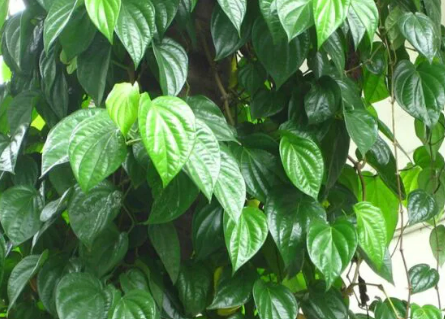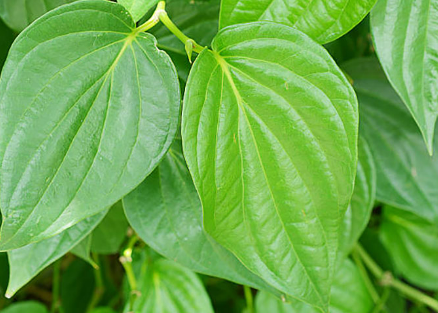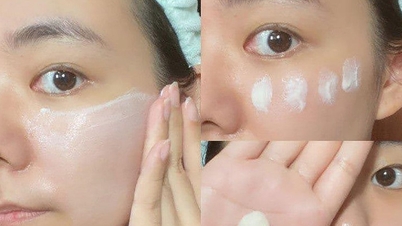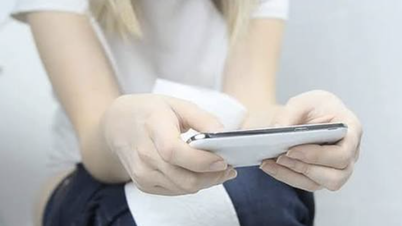Betel leaves are rich in bioactive ingredients, which are beneficial for health such as promoting a healthy digestive system, helping with oral hygiene, and good for intestinal health...
1. Benefits of chewing betel leaves
According to Ayurveda, chewing betel leaves at night can bring health benefits:
- Helps improve digestion: If you are having digestive problems, chewing a betel leaf at night will help improve digestion. Betel leaves contain many essential oils that help stimulate the release of digestive enzymes, thereby promoting digestion, preventing problems such as bloating and increased acidity.
- Improve oral health: Betel leaves are also known for their antibacterial properties, which can help fight oral infections and maintain oral hygiene. According to Ayurveda, chewing betel leaves in the evening right after eating can freshen breath, prevent tooth decay, and reduce the risk of gum disease.

Betel leaves are commonly grown in our country.
- Reduce stress and anxiety : According to Ayurveda, betel leaves contain a number of compounds that have a calming effect on the mind and body. Chewing betel leaves before going to bed can help relax the nervous system, reduce stress levels, and promote better sleep.
- Detoxifies the body: Betel leaves are known for their detoxifying properties. Chewing betel leaves at night acts as a natural detoxifier, helping to eliminate toxins from the body.
- Supports respiratory health: Betel leaves help loosen phlegm, reducing respiratory problems such as coughs and stuffy noses. You can consider chewing these leaves in the evening (after dinner) to clear the respiratory tract, soothe the throat, and help you breathe easier.
- Supports healthy metabolism: A healthy metabolism is important for maintaining optimal weight and energy levels. According to Ayurveda, chewing betel leaves in the evening after meals helps boost metabolism, aids in better nutrient absorption and energy production.
2. Effects of betel leaves
According to traditional medicine, betel leaves have a spicy taste, pungent aroma, warm properties, and affect the lung, spleen, and stomach meridians; have the effect of eliminating rheumatism, preventing cold, lowering gas, reducing phlegm, reducing inflammation, and disinfecting.
Dr. Huynh Tan Vu, University of Medicine and Pharmacy Hospital , Ho Chi Minh City, Facility 3, said that betel leaves are effective in treating cold and dampness, aches and pains, abdominal pain, bloating, infected wounds with pus and swelling, asthma when the weather changes, phlegm and difficulty breathing, colds, burns, boils, ringworm, hives, scabies, periodontitis, ear infections, and sore throats. Use 8-16g per day in decoction form. For external use, apply crushed fresh leaves or soak the leaves in water to wash.
Squeeze the juice of betel leaves and raw ginger to treat coughs, shortness of breath, and bloating. Gargle daily with water containing betel leaf extract to help prevent sore throats.
Crushed betel leaves are used to treat ringworm, hives, scabies, and insect bites. In India, betel leaves and essential oil are used to treat secretions, lung diseases, and as a poultice and mouthwash. Betel leaves are included in traditional Indian medicines along with other herbs used to treat asthma.

Chewing betel leaves can help improve digestion.
3. Who should not use betel leaves?
Betel leaves are a popular herb used in traditional medicine with many health benefits. However, there are some cases that should be considered before using betel leaves:
- Pregnant women: Should consult a doctor before using betel leaves, because it can affect the fetus.
- Breastfeeding women: Should discuss with a doctor before using betel leaves, because it can affect the baby's health.
- People with stomach problems: Betel leaves can cause stomach irritation in some people, especially those with stomach problems such as stomach ulcers or gastritis. In this case, you should consult your doctor before using betel leaves.
- People allergic to betel leaves: People with a history of allergy to betel leaves or ingredients in betel leaves should use it to avoid allergic reactions.
- Before using betel leaves in daily routine, especially when using it for treatment, you should consult a doctor of oriental medicine for proper and safe use.
Source: https://giadinh.suckhoedoisong.vn/loi-ich-khi-nhai-la-trau-khong-vao-buoi-toi-172240618221217614.htm




![[Photo] Discover unique experiences at the first World Cultural Festival](https://vphoto.vietnam.vn/thumb/1200x675/vietnam/resource/IMAGE/2025/10/11/1760198064937_le-hoi-van-hoa-4199-3623-jpg.webp)

![[Photo] Opening of the World Cultural Festival in Hanoi](https://vphoto.vietnam.vn/thumb/1200x675/vietnam/resource/IMAGE/2025/10/10/1760113426728_ndo_br_lehoi-khaimac-jpg.webp)
![[Photo] General Secretary attends the parade to celebrate the 80th anniversary of the founding of the Korean Workers' Party](https://vphoto.vietnam.vn/thumb/1200x675/vietnam/resource/IMAGE/2025/10/11/1760150039564_vna-potal-tong-bi-thu-du-le-duyet-binh-ky-niem-80-nam-thanh-lap-dang-lao-dong-trieu-tien-8331994-jpg.webp)





















![[Photo] Ho Chi Minh City is brilliant with flags and flowers on the eve of the 1st Party Congress, term 2025-2030](https://vphoto.vietnam.vn/thumb/1200x675/vietnam/resource/IMAGE/2025/10/10/1760102923219_ndo_br_thiet-ke-chua-co-ten-43-png.webp)
































































Comment (0)